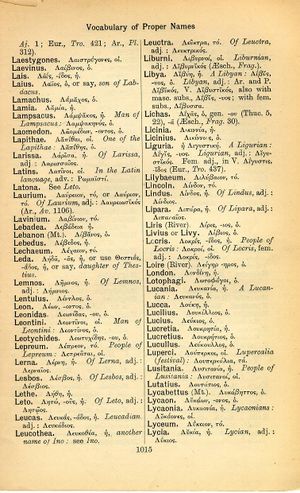Laomedon
ὁ γὰρ ἀποθανὼν δεδικαίωται ἀπὸ τῆς ἁμαρτίας → anyone who has died has been set free from sin, the person who has died has been freed from sin, someone who has died has been freed from sin (Romans 6:7)
English > Greek (Woodhouse)
Λαομέδων, -οντος, ὁ.
Latin > English (Lewis & Short)
Lāŏmĕdon: ontis, m., = Λαομέδων,
I the father of Priam and Ganymede, king of Troy, Cic. Tusc. 1, 26, 65; Prop. 2, 14 (3, 6), 2; Hor. C. 3, 3, 22; Ov. M. 6, 96; id. F. 6, 729; Hyg. Fab. 89.—Hence,
A Lāŏmĕdontēus, a, um, adj., = Λαομεδόντειος, of or belonging to Laomedon, poet., Trojan: gens, Verg. A. 4, 542: arva, Ov. M. 11, 196: flammae, i. e. the Vestal fire brought by Æneas to Rome, Sil. 1, 543.—
B Lāŏmĕdontĭus, a, um, adj., of or belonging to Laomedon, poet., Trojan: heros, i. e. Æneas, Verg. A. 8, 18: pubes, i. e. the Trojan youth, id. ib. 7, 105.—
C Lāŏmĕ-dontĭădes, ae, m., a male descendant of Laomedon: Priamus, Verg. A. 8, 158; Juv. 6, 326.—In plur.: Lāŏmĕdontĭădae, ārum, m., poet., Trojans, Verg. A. 3, 248.

